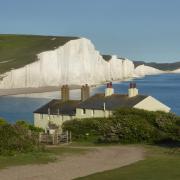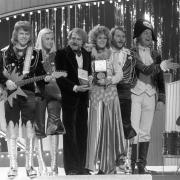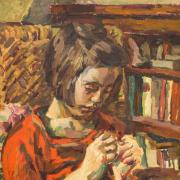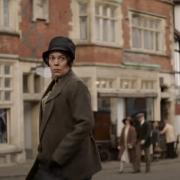Solution for the ‘Am I Not a Man and a Brother’ piece by Tony Ward in the Sussex Life October issue
Who is it? “Am I Not a Man and a Brother?”
A Rotten Borough, in the pocket of the Baron,
bribery, corruption, scandal … another age.
.
The incomer, late-comer, the undemanding Seat,
time for his family, time for his cause,
battles won, but not the war.
.
A Rotten Borough, but a statesman saint,
The conscience of a Nation.
.
Changing minds, changing lives,
human rights for humans wronged,
Sons of Africa set free.
.
And other men, and other brothers –
the children, the needy, the deaf and blind, the shipwrecked souls,
prisoners, debtors, scholars,
wings and hooves and paws,
God’s creatures all.
.
Mention not my name,
God’s will, not mine.
.
A Sussex seat his final base.
Statesman, orator, hero, saint,
a seat in the Abbey his resting place.
.
Enjoy what thou hast won, esteem and love
From all the just on earth, and all the blest above!
Solution – William Wilberforce MP (1759 – 1833) – who brought an end to The Slave Trade.
Explanation of embedded clues
William Wilberforce was an English politician, philanthropist, and the parliamentary champion of the movement to abolish the British slave trade, and subsequently the complete abolition of slavery in most of the British Empire. Towards the end of his life he was the Member of Parliament for Bramber, West Sussex. He held the seat for the last 13 years of his 45-year parliamentary career, from 1812 until 1825. Before that he had been the Member first for the town where he was born, Kingston upon Hull, at the age of 21, and whilst still a student, and then, three years later, for the county of Yorkshire.
The decision for this “incomer, late-comer” to switch to Bramber was because he wanted an “undemanding Seat, time for his family, time for his cause”. In Bramber there were little or no constituency obligations. He didn’t have to hold ‘surgeries’ or take up local causes. In fact, he rarely visited. There were less than 20 eligible voters, known as ‘burgess holders’ (men living in ‘ancient’ houses) and paying ‘scot and lot’ (local taxes).
One 1819 account, A Key to the House of Commons, by T.H.B. Oldfield, is less than complementary about the ‘ancient’ houses in Bramber, describing them as ‘twenty-two miserable thatched cottages’. Back then they were certainly not desirable character country properties, in estate agent terms, but were rented cottages under the ownership of, in this case, a local Baron, Lord Calthorpe, whose parliamentary nominee the tenants were expected to support.
Bramber was among a small number of tiny constituencies known as “Rotten Boroughs” or “Pocket Boroughs” as they were “in the pocket” of the landowner. Their formal title was nomination boroughs or proprietorial boroughs. Most were disenfranchised in The Reform Act of 1832, at which time Bramber was merged into the New Shoreham constituency. When the Ballot Act of 1872 introduced the secret ballot and entertaining voters was outlawed this effectively ended the practice of ‘buying votes’ by one means or another.
At the time of William Wilberforce’s nomination in 1812, by Lord Calthorpe, who was Wilberforce’s brother-in-law, the co-operation of the tenant-voters was secured simply by entertaining them all at a pre-election dinner. In previous centuries though, “… another age”, significant sums of money changed hands to buy votes. Bribery and corruption had been common. In 1724, Daniel Defoe, who had been a speculator before becoming a novel writer in his fifties (Robinson Crusoe), described elections at Bramber as ‘scandalously mercenary’. This history of undemocratic representation was what had earned such constituencies the derogatory nickname “Rotten Boroughs”.
This wasn’t to say though that their M.P.’s were also corrupt. There were many respected leading politicians who were Members for such safe seats, including William Wilberforce, “A rotten Borough, but a statesman saint”.
Many satirists though have had fun with the image of “Rotten Boroughs” over the years.
From Iolanthe, by Gilbert & Sullivan:
The Fairy Queen to Strephon: ‘… with a fairy brain you should seek an intellectual sphere of action. Let me see. I’ve a borough or two at my disposal. Would you like to go into Parliament?’
From the Dish and Dishonesty episode of Blackadder Series III, BBC TV:
‘A rotten borough, sir, is a constituency where the owner of the land corruptly controls both the voters and the M.P. We must buy Dunny-on-the-Wold at once and thus control the (only) voter … The only question is who to choose as an M.P. ... A man with no mind, with no ideas of his own … Baldrick, prepare for government.’
But to return to William Wilberforce’s adopted mission in life. British ships had been involved in the triangular slave trade route since the 16th century. British goods were taken to Africa to buy slaves who were then transported in terrible conditions across the Atlantic to the West Indies where they were sold to buy goods to sell back in Britain. These were mainly slave-grown sugar, cotton and tobacco. By the end of the 18th century this trade made up about 80 percent of Britain’s foreign income.
By this time however, people were waking up to the horrific nature of the slave trade, of which the largely Christian nation was unaware. It was initially the Quakers together with group of Christian campaigners known as the Testonites, who first brought the matter to the attention of the public and to Parliament. To make any significant progress though they needed a ‘man on the inside’, a respected MP who was prepared to champion the anti-slavery cause regardless of opposition from vested interests.
William Wilberforce was that man. From being one who had enjoyed a hedonistic lifestyle during his time at Cambridge University and for some while after, enjoying a lively social life, “the wittiest man in England”, around 1785, aged 26, he underwent a spiritual conversion. Regretting his past ways, he became an evangelical Christian. Wilberforce wished to put his new Christian principles into action. He was approached by the anti-slavery lobby and after some hesitancy as to whether he was the best person for the task his old college friend and fellow parliamentarian, William Pitt, helped him reach a decision.
It was May 1787 and Wilberforce, Pitt and the other future Prime Minister William Grenville were sitting under a large oak tree on Pitt’s estate in Kent. The conversation turned towards the challenges ahead of them. Pitt challenged Wilberforce, “Why don’t you give notice of a motion on the subject of the Slave Trade? You have already taken great pains to collect evidence.” The decision that was to change the lives of millions of black African slaves was made, “Sons of Africa set free”. Wilberforce wrote in his journal “God Almighty has set before me two great objects, the suppression of the Slave Trade and the Reformation of Manners (moral values)”.
The poem title “Am I Not a Man and a Brother?” quotes the motto from a campaign logo of a chained kneeling slave, designed by Josiah Wedgewood for a brooch or medallion for supporters. Wilberforce’s achievement, over his lifetime, was in “Changing minds, changing lives, human rights for humans wronged”.
He became “The conscience of a Nation” and specifically ‘the keeper of the young Minister’s conscience’, (W.S. Churchill, A History of the English-Speaking Peoples). The ‘young Minister’ was William Pitt the Younger, his old friend from Cambridge days. The group who gathered round Wilberforce became known as ‘the Saints’.
Their campaign to abolish the slave trade was a long one. Pitt was reluctant to alienate the Bristol and Liverpool merchants. Finally though, after William Pitt’s death in January 1806, the new Prime Minister, Lord Grenville, tried a new tactic. He first introduced the Abolition Bill into the House of Lords rather than the House of Commons. He won over the Lords. This was the greater challenge overcome. Charles Grey then moved for a second reading in the Commons on 23 February 1807. The Bill was carried by an overwhelming majority. At last! … Wilberforce’s face streamed with tears. The Slave Trade Act received the Royal Assent on 25 March 1807 and passed into law.
But the greater challenge was still to come. It was not until 1833 that the practice of slave-owning itself was abolished in the Slavery Abolition Act of 1833. This was brought through under the premiership of Wilberforce’s earlier ally, Charles Grey. (He was also the P.M. who brought in the Reform Act of 1832 to deal with the “Rotten Boroughs”). It was quite an eventful time historically. Darwin voyaged to the Galapagos Islands, the Tolpuddle Martyrs were transported to Australia, and the old Houses of Parliament burned down!
The final stages of the battle against slavery were one of the reasons why Wilberforce switched to his Bramber constituency, “battles won, but not the war”. He needed to free himself from his previous constituency workload and ‘to be a less constant attendant in the House of Commons’. He had never been in the best of health and resigned from Parliament altogether in 1826 in order to conserve his energies for the final push. He died, aged 73, just three days after hearing that the passage of the Slavery Abolition Act through Parliament was assured. The news was brought to him by his Clapham Sect friend, Thomas Babington Macauley. Wilberforce is reported to have said, ‘Thank God that I should have lived to witness the day in which England is willing to give 20 millions sterling for the abolition of slavery’. To put this sum in context, in current values the income was equivalent to that generated by our present-day IT industry, currently employing over one million people.
From having once been the biggest player in the Slave Trade, Britain had now become a leading player in its abolition. The implementation of the Act throughout the British Empire set an example to other nations. Take up was patchy though and sometimes anti-slavery legislation was not able to be effectively enforced. For some considerable time, the American government, which had also passed an anti-slave-trade Act, struggled against vested interests in some of the Southern states with their history of slave ownership. However, over the following years, Wilberforce’s cause became accepted internationally as a mark of a civilised nation.
As if this wasn’t enough of an achievement for one lifetime, there was also Wilberforce’s philanthropic work. This wasn’t always so high profile, “Mention not my name, God’s will, not mine.” The verse starting “And other men, and other brothers – “, mentions just some of about seventy charitable causes to which he contributed. In accordance with his Christian principles he set aside a percentage of his annual income, and more, to help others, ‘It is the true duty of every man to promote the happiness of his fellow creatures to the utmost of his power’.
As well as countless individuals whom he helped, he played a leading role in establishing start-up organisations which were to develop into the Church Mission Society, Schools for the Deaf and Blind, the RNLI, the RSPCA and the London School of Hygiene and Tropical Medicine. In the case of the latter his philanthropic legacy touched that of two present day philanthropists. The Bill and Melinda Gates Foundation are continuing the fight with a major 40-million-dollar programme of work to combat Malaria.
The last two lines of my poem quote the last two lines of a tribute, ‘Sonnet to William Wilberforce, Esq.’ by William Cowper (1731 – 1800). Cowper (pronounced ‘Cooper’) was not only a poet but a hymn-writer. One of his best-known hymns is ‘God moves in a mysterious way’. He also collaborated with fellow hymn-writer John Newton, a former slave-ship captain, who penned ‘Amazing Grace’. Both men were great supporters of Wilberforce’s works and helped him get through those times when progress was difficult. Newton wrote “God has raised you up for the good of the church and the good of the nation … but for such a time as this God has brought you into public life and has a purpose for you.”
Cowper’s Sonnet was written after Wilberforce’s initial marathon Abolition speeches when he was just beginning to make some headway on his anti-slavery campaign. Wilberforce’s first three-hour speech had set out all the cold facts of the slave trade, as researched by his fellow campaigner Thomas Clarkson. The speech combined hard evidence with an impassioned plea. For Wilberforce the slave trade was a sin for which Britain had to repent or be damned. He finished with the entreaty, ‘Having heard all of this you may choose to look the other way but you can never again say that you did not know’.
There were to be more similar speeches before the campaign was won. In an 18 April 1791 speech to the House of Commons, he repeated his message, ‘Never, never will we desist till we have wiped away this scandal from the Christian name’. What had been almost annual occasions of the votes on his Bill were gradually wearing down the objectors but Cowper realised that Wilberforce still had some way to go. His sonnet was to encourage him not to give up. Other lines read ‘… the better hour is near, That shall remunerate thy toils severe …’.
As has already been noted, that ‘better hour’ did eventually come and Cowper’s sonnet now forms a fitting epitaph.
William Wilberforce was buried in Westminster Abbey. As a newspaper report of his funeral recorded, the members of the House of Commons turned out in force. Both Houses of Parliament suspended their business. Wilberforce had not been a party-political animal, he was an independent, ‘no party man’. He fought for his beliefs and for this he was respected by all sides. The funeral was a more than usually moving occasion. Within hours of the news of his death, over one hundred of the ’great and good’, including the Duke of Gloucester, the Lord Chancellor and the Speaker of the House of Commons had urged that he be honoured with burial in the Abbey. The newspapers reported that the Members followed his coffin, ‘two and two abreast. During all this time the Abbey bell tolled … slowly and solemnly’.
Besides his grave, “A seat in the Abbey” is also his for eternity. The phrase refers to Wilberforce’s seated memorial sculpture. Close by is also to be found the grave of his friend, Prime Minister William Pitt the Younger.
Acknowledgement of sources
• Andrew Taylor, The Pocket Guide to Poets and Poetry, Remember When, 2011.
• Christopher Lee, This Sceptred Isle 55BC – 1901, Penguin Books/BBC Books, 1997 (p. 457) (quotes extensively from W.S. Churchill’s, A History of the English-Speaking Peoples).
• en.wikipedia.org/wiki/William_Wilberforce
• www.mylearning.org/william-wilberforce/p-690/ (by Hull Museum Education – Kingston upon Hull was Wilberforce’s birthplace)
• www.steyningmuseum.org.uk/boxfiles/ttrotten.html (entertainingly describes the historical election scandals in the two ‘Rotten Boroughs’ of Steyning and Bramber).
• www.historyofparliamentonline.org/volume/1820-1832/constituences/bramber (describes the electoral background of Bramber in Wilberforce’s time).
• www.british-history.ac.uk/vch/sussex/vol6/pt1/pp200-214 (describes the electoral background of Bramber throughout the centuries before Wilberforce’s time).
• www.poetryfoundation.org/poem/173290 (Sonnet to William Wilberforce, Esq. by William Cowper (1731 – 1800), published in 1792).
• Relevant websites found by searches for ‘William Wilberforce’, ‘William Wilberforce and Bramber’, ‘Rotten Boroughs’, ‘William Wilberforce abolition speech’, ‘William Wilberforce and the RSPCA’ ‘William Wilberforce quotes’, ‘Poems about William Wilberforce’.


























